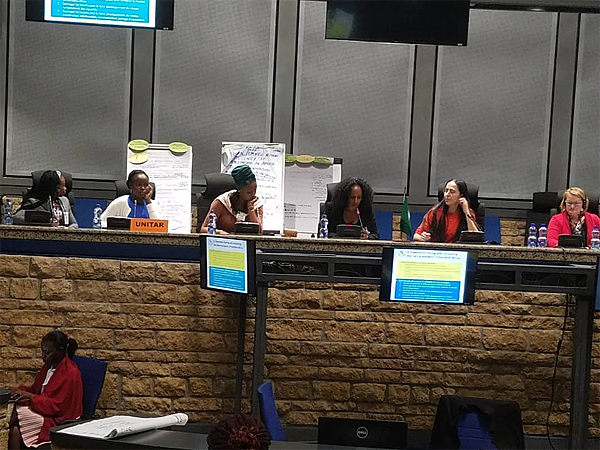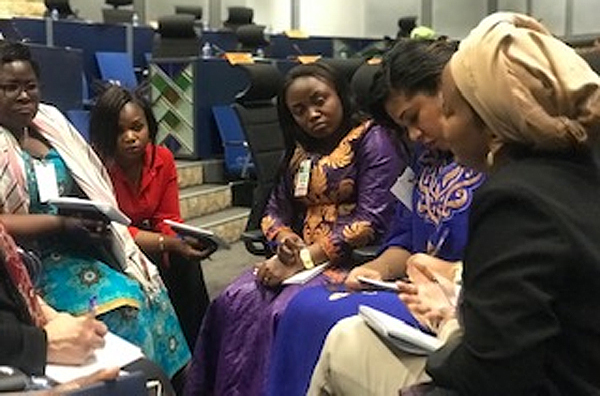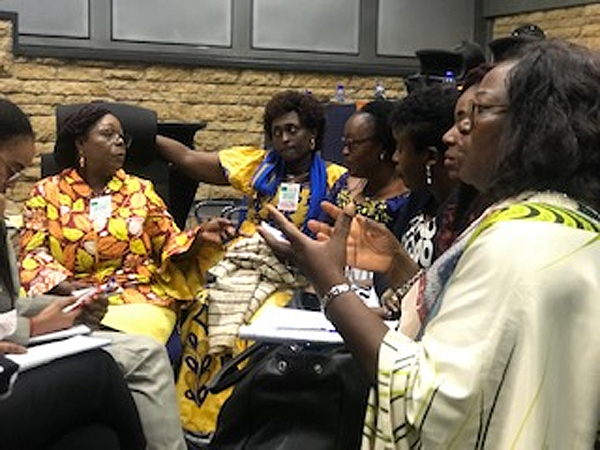African women set on ending violent conflicts on continent
Poor governance, poverty, youth unemployment and competition for natural resources are some of causes of the conflicts.
OPINION
By Hope Kivengere
A fortnight ago, I was among one hundred African women who met in Addis Ababa to bring our thoughts together on the role women can play in mediating the conflicts that continue to plague Africa.
We came together under the umbrella of FemWise-Africa, (Network of African Women in Conflict Prevention and Mediation), a newly formed network of African women established by the African Union in July 2017, opening the door for women to fully participate in the struggle to end violent conflicts across Africa.
No easy task.
A quick scan of the continent will tell you that there are more than 10 African countries currently caught in a cycle of violent conflict, albeit in varying degrees: Mali, Somalia, Cameroun, Burundi, Chad, Central African Republic, Libya, Mozambique, South Sudan, Sudan, Nigeria, DRC and Ethiopia, to name some. The causes of the conflicts are many: poor governance, poverty, youth unemployment, competition for natural resources, mismanagement of elections, environmental degradation, religious bigotry, exclusion and marginalization. Often, two or more of these overlap, making the conflict hugely complex and extremely difficult to resolve.
The AU has gone to great lengths to mediate the conflicts, bringing the protagonists to the dialogue table, encouraging ceasefires and sometimes securing peace agreements. However, the mere signing of a peace agreement has not necessarily meant that violence ceases, as we have seen in the South Sudan peace process. Some agreements have held for a few months, or even years, only to disintegrate as the actors fall back into violence over issues not adequately addressed. In the process, many lessons have been learnt, arming the AU with more in-depth knowledge of what can make peace processes more effective and sustainable.
An important lesson to emerge has been that peace processes that do not involve women are not likely to result in sustainable peace. Women are by far the most affected by violent conflict: they are left to raise children when men go off to fight or are killed in the violence, they are often displaced from their homes and forced to live as IDPs or refugees, they bear the brunt of sexual violence, including rape, are forced into sexual slavery by the fighters, remain the sole providers for their children, and have to struggle to find water, fuel and land for cultivation in order to sustain their families (children, the elderly, the sick).

And yet, despite the difficulties they face during violent conflict, women have been actively involved in mediation and conflict resolution, devising innovative strategies to resolve conflicts and bring about peaceful co-existence. All over Africa, women have worked ceaselessly, at community level, to bring together individuals and groups locking horns in violence, sometimes in formal but often in informal settings. Unfortunately, their role remains largely unrecognized. But the strategies devised by women in their communities can be useful building blocks for creating peace at national, regional and continental level.
The AU recognizes that leaving women out of formal regional and continental peace processes, is one of the most critical weaknesses in peace initiatives across the African continent. This hard-learnt lesson has led the AU to proactively look for ways and means of including women in the various mediation and conflict resolution efforts under the AU and its regional economic communities, known as RECs. The establishment of FemWise-Africa is a culmination of those efforts and the highest expression of the AU's commitment to bringing African women on board as active participants in Africa's mediation and conflict resolution initiatives.
In December 2016, an African Women Mediation Workshop was convened in Constantine, Algeria to deliberate on the theme Silencing the Guns by 2020: Women's Inclusion in Pre-Conflict Mediation, at the Peace Table and in Social Cohesion." In December 2017, FemWise-Africa convened its first general assembly during which we deliberated on the theme: Silencing the Guns by 2020: Women Mediating & Promoting Cross Border Cooperation. And last week, we gathered in Addis for FemWise-Africa's second general assembly to deliberate on the theme: Silencing the guns by 2020: Women's Role in Preventing and Resolving Natural Resource-Related Conflicts.
The AU Commissioner for Peace and Security, Ambassador Smail Chergui, put the meeting into context by stressing that in order to resolve the conflicts dogging the continent, Africa needs all hands on deck. A clear recognition that, so far, not all hands have been on deck, most especially women. This was a clarion call to women, which all of us gathered in the meeting embraced with two arms. I was reminded of Michelle Obama's words, "There is no limit to what we, as women, can accomplish."
And during the two days in Addis, the women did not disappoint.
Rolling out their experiences and acquired knowledge, they demonstrated what a formidable force women can be in devising formal and informal strategies and initiatives to bring about peace. What is now needed is to integrate their experiences into national, regional and continental processes.

The AU acknowledges that when natural resources, that is land, water, timber, minerals and oil, are poorly managed or inequitably shared, they become a source of conflict for those who need to use them for their livelihoods. Even where these are managed equitably, their utilization can be negatively impacted by population growth, environmental degradation, climate change and population explosion, all of which intensify competition for the resources and create tensions that often lead to violence. The women's meeting in Addis examined trends in this sphere, heard what women have been doing to address such scenarios and what further role African women can play to resolve the conflicts. Our ultimate goal is to put an end to the notion of violence as a solution to any conflict.
One woman pointed out that natural resources contribute to 65% of the conflicts in Africa. Unfortunately, although women are the prime users of natural resources, their role in resolving conflicts related to natural resources has not been explored adequately. So the question was, how can women help to create mechanisms to govern, manage and create equitable access to natural resources?
Presentation after presentation, the women revealed that they have taken the bull by the horns and are already doing something to address this issue. Some are involved in mapping out stakeholders in the ownership, management and use of natural resources, a useful tool to ensuring that no-one is excluded or marginalized. Others are engaged in building the capacity of women to take part in formal peace processes, bringing on board their experiences in the informal peace processes they have been involved in at community level. Commendably, even without formal skills, women have been able to carry out initiatives that have helped to bring protagonists in their communities to dialogue.
There is growing awareness that women are the best placed to identify early warning signs of conflicts in their communities and, therefore, if adequately involved in mediation processes, can significantly contribute to rechanneling a conflict from violence to dialogue. One woman shared her understanding of peace building and development, describing peace building as "increasing connectors and decreasing dividers," and development as "building capacities and decreasing vulnerabilities." This, at various levels, is what women across Africa are busy doing in their different capacities.
A key component of our discussions centered round the question of how to create an atmosphere where women feel that they truly belong. This is an important issue considering how far African women have come down the ages: no voice, no rights, no land, no inheritance, no property, no education, no power to decide, silent opinion and, sometimes, no face - just shadows moving around cooking, washing, cleaning, scrubbing, peeling, moulding pots, fetching water, collecting wood, clearing land, digging, planting, harvesting, bearing and raising children, nursing the sick, weaving baskets, rearing animals, carrying produce to the market, getting beaten, raped, insulted, jeered, mocked, begging for mercy, kicked out of their homes for younger faces, sold for cows, fleeing violence, keeping quiet, always on the margins but, at the same time, gate keepers of family values and honour. That has been our crucible for ages.

No wonder that even as formal education opened the door to a new world for us, and we finally started breathing fresh air, we are still struggling to make this new world truly ours. We are still struggling to take our rightful place at the decision-making table. We were recently elated when our fellow FemWise member and one of its founders, Mrs. Sahle-Work Zewde, was appointed president of Ethiopia, a great achievement for African women.
We are grateful for those opportunities that have come our way. Merci Dieu! But, like Oliver Twist, "We want some more." Because, if truth be told, we are not there yet. Our girls still drop out of school due to lack of sanitary towels - if African governments reduced the money they spend on armed tanks, and spent the money on building a factory for sanitary towels in each region, every African girl could be provided with free sanitary towels. Our girls are still being subjected to the horrors of FGM, they are still being subjected to rape as a weapon of war, they are still being trafficked across the seas to work as sex slaves, they are still shamelessly being sexually violated by men in households where they work as maids, where they live as nieces or sisters-in-law, in schools and universities, abused by the very men who are supposed to be their benefactors, protectors or guardians (uncles, fathers, brothers, cousins, in laws, lecturers, teachers, head teachers, priests - you name it)!
So, despite some major breakthroughs, we continue to live in a male dominated world. Hence the question: How can we create an atmosphere where women feel that they truly belong?
We decided that we must work round the clock to push for women not only to be included at all levels of decision-making but also make sure that we place women who will have influence. We have examples of women who have used their voices to make a difference: Graca Machel who pushed for women to be included in the Kenya peace process; Winnie Mandela who carried the torch, and the pain, for 27 years of the South African struggle for freedom; Wangari Mathai who led the struggle to save the environment in Kenya, founding the Green Belt Movement. Just a few examples. The more women of influence we have at top levels, the more chances we shall have of bringing on board the rich experiences and knowledge acquired from the numerous efforts by women across Africa in making peace and resolving conflict, and make a difference.
Our vision as African women is to see an Africa where the guns are finally silent, where the idea of violence as a solution is thrown on the dung-heap of history so that we can finally focus on using our natural resources, our energies and knowledge, of which we have plenty, to create development and prosperity for ourselves, our children and our grandchildren.
The confidence, clarity of mind, high intellect and enthusiasm exhibited by FemWise-Africa women in Addis last week was evidence that Africa has an impressive reservoir of women who can do the job. We left Addis totally invigorated, energized and emboldened. I strongly believe that we can effectively debunk the conceptual framework that has boxed us into seeing ourselves as helpless victims and create a new one where we assert ourselves as leaders, decision makers and active participants in all aspects of life while at the same time positively reinforcing our roles as mothers, sisters and spouses.
As we embed our values into the processes of mediation and conflict resolution across our beloved continent, we may keep in mind the words of our sister Maya Angelou: "By demonstrating that all peoples cry, laugh, eat, worry, and die, we can introduce the idea that if we try and understand each other, we may even become friends."
*FemWise-Africa is co-chaired by Mrs. Catherine Samba-Panza, former president of the Central African Republic, and Dr. Specioza Wandira Kazibwe, former vice president of Uganda.
The writer is Uganda's representative to the COMESA Committee of Elders